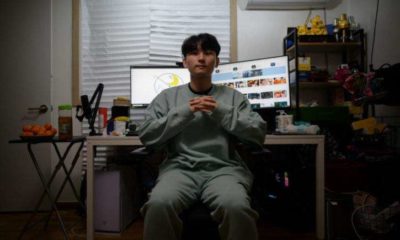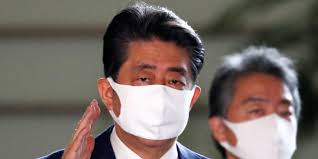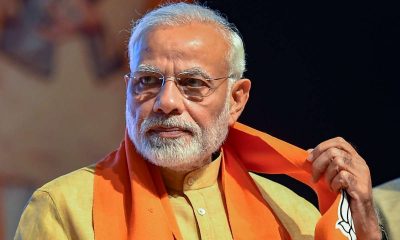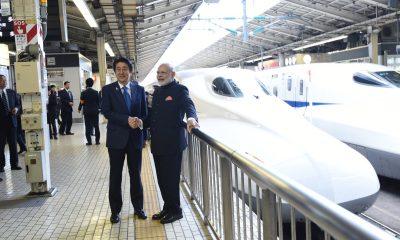World
South Korea, Japan agree to speed up talks during summit

Seoul: South Korean President Park Geun-hye and Japanese Prime Minister Shinzo Abe agreed Monday to speed up talks on Japan’s wartime sex slavery of Korean women to reach an agreement on the issue at an earliest possible date, Park’s office said.
Kim Kyou-Hyun, senior foreign affairs secretary to President Park, told reporters that the two leaders agreed on it with the fact in mind that this year is a turning point marking the 50th anniversary of normalized diplomatic ties between Seoul and Tokyo, a news agency reported.
Park and Abe held their first-ever one-on-one summit in more than three years in South Korea’s presidential Blue House on the sidelines of a trilateral leadership meeting with Chinese Premier Li Keqiang that was held in Seoul on Sunday.
The agreement between Park and Abe can be considered advancement in the bilateral relations.
South Korea has called for Abe to make a “sincere” apology and properly compensate for Korean “comfort women”, who were forced into sex slavery for Japanese military brothels during World War II.
Japan, however, has claimed that the issue was resolved in a 1965 treaty that normalized diplomatic ties between Seoul and Tokyo. Several rounds of diplomatic talks had been held for the issue, ending up with no fruits.
South Korean historians estimate that more than 200,000 women, mostly from the Korean peninsula, were forced to serve as sex slaves during the devastating war. Surviving sex slavery victims are gradually passing away as their age averages nearly 90, with only 47 still alive in South Korea.
“I anticipate that today’s meeting becomes a broader and sincere dialogue that can cure the painful history, so it serves as a precious opportunity to develop bilateral relations,” Park said during her introductory remarks for the extended summit meeting.
Park reiterated her position that Seoul and Tokyo should make a turning point to overcome history and leave for a future together this year, which marks the 50th anniversary of normalized diplomatic ties between the two countries.
In response, Abe stressed the need for a “frank” exchange of views between leaders of the two countries.
“I have said that it is necessary to frankly exchange the leaders-level opinion and that a door is open to dialogue,” Abe said, noting that the first-ever bilateral summit would be very significant to the peoples of the two nations.
Abe arrived in Seoul Sunday for the trilateral leadership meeting with Park and Chinese Premier Li Keqiang in Seoul on Sunday, also the first in three and a half years.
The Seoul-Tokyo summit was last held in May 2012 between then South Korean President Lee Myung-bak and then Japanese Prime Minister Yoshihiko Noda.
World
Lockdowns in China Force Urban Communities to Defy Censorship and Vent Frustration Online

Shanghai’s rich middle class is leading a wave of online dissent over the strict and prolonged lockdowns imposed in various parts of the country. Chinese internet censorship is struggling as patience is wearing thin in many urban centers, coming up with creative forms of online protests.
Social Media Posts Revealing Lockdown Tension in Shanghai
Drawn-out lockdowns are nothing new in China as authorities insist with the nation’s zero-Covid policy since the start of the pandemic. Currently over This time around, however, metropolitan areas like Shanghai are increasingly difficult to keep quiet, given that its more than 25 million residents have seen weeks of total isolation along with food shortages and many other service interruptions.
Dozens of towns and reportedly over 300 million Chinese citizens have been affected by lockdowns of different severity. As expected, urban netizens have been most outspoken over their difficulties by finding creative ways to get around state censorship and bans placed on topics, news comments and spontaneous campaigns.
Shanghai residents have been using mobile proxies and hijacking seemingly unrelated hashtags to talk about healthcare issues, delivery failures and the overall severity of their situation. The “positive energy” that the Chinese government wants to transmit during the recent prolonged series of lockdowns does not come naturally to those counting food supplies and online censors are working hard to filter words, trending topics and undesired social media sharing.
WeChat groups and message threads are under constant monitoring. Posts questioning the zero-Covid approach have been quickly deleted, including by leading Chinese health experts like Dr. Zhong Nanshan. Video footage is soon censored and protests and investigations are quickly made to disappear.
Where this has not worked, officials have exposed banners with warnings and outright threats like “watch your own mouth or face punishment”, while drones have been patrolling the city skies. Yet, if anything, this has led to further tensions and unspoken confrontation with Shanghai’s educated and affluent middle class.
Creative Online Solutions Harnessing Civic Energy
Announcements by Chinese social media that they would be publishing the IP addresses of users who “spread rumors” have not helped either. Tech industry research has shown that much of Asia’s tech-savvy population has a habit of using mobile proxies and other privacy tools, quickly finding workarounds to browse the internet freely and talk to the world about the hottest topics.
The sheer volume of forbidden posts is already a challenge for the very censorship system, experts explain. Unable to track all trending hashtags, state workers overlook topics that speak about the US, Ukraine or other popular news. Linking human rights elsewhere to their situation, Chinese online dissidents establish their informal channels and “hijack” the conversation to share personal or publicly relevant information about the Covid suppression in their town.
Sarcastic and satirical posts still dominate. Others hope to evade the censors by replacing words from famous poems or the national anthem. One thing is certain – social media, when harnessed with the right creativity, has proven its ability to mount pressure on the government in even some of the most strictly controlled tech environments like China.























